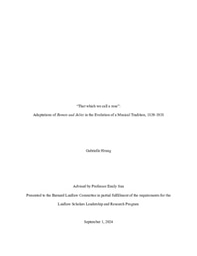It’s hard to believe that my LiA has already come to an end. Since starting to teach piano at GSBTB in April, it’s been so rewarding to get to know the staff and students who return week after week. I’m really inspired by the staff’s dedication to fostering an open, welcoming atmosphere for all students and the organization’s overall commitment to accessibility—something that I believe all musical spaces should strive toward and a mindset that I will take with me into the future. It was bittersweet to say goodbye and to tell students that I won’t be back after GSBTB’s summer break, but I was thankful for the time spent working with students and witnessing their growth.
Overall my LiA went very smoothly; I didn’t have any issues getting in contact with the organization and I appreciated the consistent communication from the project manager. The only bump in the road was timing; I had initially planned for my LiA to last all throughout July and into August, but once I started in April, I learned that GSBTB has their summer break during that exact time frame. Thankfully I was already in Berlin because of my exchange year and simply started my LiA earlier than expected.
My LiA ended on a high note (no pun intended): the project manager told me that a filmmaker is making a documentary about OMS and invited me for an interview about my experiences! Honestly I’m always nervous about public speaking and I had never done an interview before (it’s quite daunting with several cameras and a ring light in your face), but the filmmaker led an engaging conversation and I was happy to talk about what I had learned from my time as a piano teacher. I learned a lot from working with mostly adult students from different national and cultural backgrounds. Many students had previous musical knowledge from different schools of thought. For example, knowing the note names by solfège (Do Re Mi Fa Sol La Ti Do) rather than alphabet (A B C D E F G), so I learned to explain how both systems refer to the same notes—it’s a strength rather than a weakness or distraction to know a different system. Sometimes students only knew musical terms in their native tongue and we relied on Google Translate to ensure we were talking about the same concepts, and other times I drew upon my (limited) knowledge of German musical terminology to teach the basics. It was a challenge but a welcome one; I’d love to continue teaching if I could. Vielen Dank GSBTB!

Please sign in
If you are a registered user on Laidlaw Scholars Network, please sign in